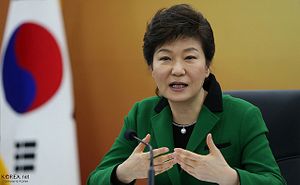Japan and South Korea are in the midst of negotiating important security and economic issues, as diplomatic relations have begun to thaw in recent months. Their cooperation in these two vital areas has stagnated since Japanese Prime Minister Shinzo Abe came to power in late 2012, and particularly since he visited the controversial Yasukuni Shrine in December 2013. While he has yet to meet with South Korean President Park Geun-hye, Seoul appears to be warming to the idea. However, there are a few issues of a non-vital, domestic nature on both sides that could derail this emerging movement toward reconciliation.
After last week’s first meeting of both countries’ vice foreign ministers since Park took office and Seoul’s statement of hope that their relationship could begin to develop next year, movement was made on the defense front as well. A South Korean defense official told the press on Monday that “South Korean Vice Defense Minister Baek Seung-joo and Japan’s Hideshi Tokuchi, vice defense minister for international affairs, will hold talks in Seoul on October 29.” The two will meet on the sidelines of the Seoul Defense Dialogue, a regional security forum for vice-ministerial level officials, and according to the Jiji Press are expected to discuss Japan’s reinterpretation of its constitutional ban on collective self-defense as well as North Korea’s persistent nuclear and ballistic missile programs. More importantly for bilateral ties, “The Japanese side is expected to call for the swift conclusion of a bilateral agreement on military information security.” Japan is also seeking a similar agreement with their mutual ally and security guarantor, the U.S.
On the economic front, both sides agreed on Friday in Washington to restart talks on financial issues, at a meeting between South Korea’s Finance Minister Choi Kyung-hwan and his Japanese counterpart Taro Aso. While the two had a chance to speak at the G20 Summit in Cairns in late September, this was their first official bilateral meeting of finance ministers in 23 months. The meeting was intended to increase the exchange of finance officials, while “dialogue between their fiscal authorities about economic and financial cooperation is expected to be resumed for the first time since November 2012.” Japan again pressed its case for a summit of the two countries’ leaders, which Tokyo is hoping will happen at the upcoming APEC Summit in Beijing, with Aso stating “we will pave the way for the two sides to consider it.”
While high-level talks are becoming more frequent and South Korea appears more amenable to improving ties, challenges remain in the way of a more normal relationship. The biggest and most immediate of them could come this Friday, as several Japanese lawmakers and at least one Cabinet member will visit Yasukuni Shrine for an annual fall festival. Minister of Internal Affairs and Communications Sanae Takaichi, one of Abe’s new appointees, has said she “will stay true to [herself] and continue my visit as a Japanese.” The shrine holds the remains of Japan’s war dead, including Class-A war criminals from the Second World War. Both South Korea and China in particular are roused to anger when Japanese officials visit the shrine, although Abe will abstain this time as he will be traveling abroad.
In addition, Japanese officials have said they intend to bring international pressure on South Korea to open up to Japanese seafood imports, as it has banned them from eight prefectures including Fukushima. After raising the issue for a fourth time at a WTO committee meeting on Wednesday, Japan is considering putting the issue before the “WTO’s dispute settlement process,” as it claims that the South Korean ban is against formal international trade rules.
On Tuesday the South Korean foreign ministry also chastised Japan for what it called “unnecessary remarks” concerning an ongoing defamation case against a Japanese journalist in Seoul. The Japanese Sankei Shimbun’s Seoul bureau chief Tatsuya Kato was indicted last week on libel charges against Park, for reporting “rumors” questioning the president’s whereabouts during the Sewol ferry sinking. This was after Japan summoned a South Korean embassy official in Japan “to convey our message that we are gravely concerned about the indictment… in light of press freedom and the Japan-South Korea relationship.”
While none of these contentious issues are of vital national importance, they often inhibit meaningful discourse between the two countries and the improvement of economic and security concerns. The more nationalistic tone of the Japanese government since Abe came to power, exemplified in his visit to Yasukuni and the review this summer of the Kono statement, have been the largest impediments to improved ties in the last few years. The two countries are likely to overcome minor obstacles over trade and press freedoms if nationalist issues are not inflamed. Abe’s decision not to visit Yasukuni this week is a step in that direction, yet it will require a longer and broader commitment from the administration to even begin to return ties to where they were before Abe took office.

































